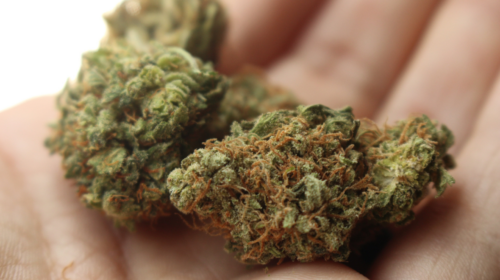Researchers have been debating which substances are the “most addictive.” An addiction is considered a compulsive substance-seeking behavior, tolerance to the substance, and withdrawal symptoms that occur when use is cut down or stopped.[1]
According to the National Institutes of Health, about 10% of Americans have an addiction to drugs or alcohol.[2] While all addictions are difficult to overcome, some substances are more likely to cause addiction and more challenging to beat.
What Is the Most Addictive Substance?
All drugs are addictive, but the most addictive substances can vary by different factors. These are generally considered to be the most addictive substances in the world:
Cocaine
Cocaine is a powerful stimulant drug that’s derived from the coca plant native to South America. Though it once had a medical use, cocaine is primarily manufactured illicitly in the form of white powder or rock form (crack).[3] It may be snorted, smoked, or injected, though crack is primarily smoked, and produces an intense but short-lived high that floods the brain with dopamine.
Along with a strong euphoria, cocaine produces feelings of alertness and excitement. Because the feelings come on strong and wear off quickly, people often binge cocaine to maintain their high – eventually leading to a crash with intense cravings, depression, and fatigue.[4]
Though it’s a common party drug that may be considered “harmless” by some, cocaine is a highly addictive drug that carries the risk of overdose and long-term health problems, including asthma, respiratory distress, bowel decay, infections, vein collapse, nosebleeds, loss of smell, and an increased risk of contracting bloodborne diseases like HIV and hepatitis C.[5]
Heroin
Heroin is an opiate that activate opioid receptors in the brain, increasing relaxation, blocking pain, and producing euphoria by increasing dopamine production.[6] According to the Centers for Disease Control and Prevention (CDC), heroin addiction is on the rise due to tighter controls over prescription opioid drugs like Vicodin (hydrocodone) and OxyContin (oxycodone).[7] Many consider heroin to be the most addictive drug in the world.
The American Society of Addiction Medicine (ASAM) estimates that nearly a quarter of people who try heroin will become addicted to it.[8] Heroin brings a powerful high and can cause dependence quickly with regular use. Cutting back or stopping use can cause intense withdrawal symptoms, such as depression, insomnia, anxiety, diarrhea and vomiting, cold flashes, and severe cravings.[9]
Alcohol
Alcohol is among the most used substances in the world and plays a big role in many cultures. More people over age 12 in the US have used alcohol in the past year than any other drug or tobacco product, and alcohol use disorder is the most common type of substance disorder.[10]
Because alcohol is a legal and socially acceptable substance for people of legal drinking age, easy to access, inexpensive, and used responsibly by many people, it has a high potential for abuse and addiction. Alcohol affects dopamine levels to enhance mood, but it depresses the central nervous system and slows down motor skills and cognition.[11]
When alcohol is consumed heavily or in binge drinking patterns, it can lead to dependence. The withdrawal from alcohol is intense – even life threatening – and may lead to symptoms like anxiety, depression, insomnia, tremors, irregular heart rate, high blood pressure, psychosis, and seizures.[12] Because of the intensity of withdrawal, some people try to self-medicate alcohol withdrawal and perpetuate their addiction.
Nicotine
In 2021, nearly 12 of every 100 US adults aged 18 years or older smoked cigarettes, which is about 28 million adults.[13] According to the CDC, cigarette smoking remains the leading cause of preventable disease, disability, and death in the US, accounting for more than 480,000 deaths each year.[14]
Nicotine affects the reward circuits in the brain after being absorbed through the mouth, nose, lungs, and skin. It elevates the mood and cognition, leading smokers to continue to smoke.[15] The effects of nicotine begin about 10 seconds after it is smoked and wear off within hours, so smokers want to have another cigarette not long after finishing the last one.
Smoking regularly leads to dependence quickly, making nicotine the most addictive substance that’s legal and available, next to alcohol. Nicotine is also one of the hardest substances to stop without help, due to withdrawal symptoms like poor concentration, anxiety, increased appetite, poor focus, and intense cravings.[16]
Methamphetamine
According to the National Institute on Drug Abuse, 2.5 million people aged 12 or older reported using methamphetamine in the past 12 months.[17] Methamphetamine, or meth, is a powerful stimulant that’s made illicitly. It comes in the form of powder or crystal, which can be smoked, snorted, or injected for an intense high. A derivative of amphetamine, meth increases focus, decreases the need for sleep or eating, and increases feelings of pleasure.
Meth tolerance builds quickly, leading people to take repeated doses to keep feeling high.[18] Long term, meth damages the regions of the brain responsible for learning, memory, and emotional regulation, depletes dopamine, and affects the way the dopamine receptors work.[19] This causes depression, suicidal ideation, and extreme cravings.
Getting Help for Addiction
Addiction has been a growing problem, but it’s even more concerning with the rise of dangers like fentanyl and other synthetic opioids. If you or a loved one is struggling with addiction to these substances – or any others – Recovery Unplugged is here to help. Contact us today to learn more about our addiction treatment options.
Sources:
- [1]What is a substance use disorder?. Psychiatry.org – What Is a Substance Use Disorder? (n.d.). Retrieved from https://www.psychiatry.org/patients-families/addiction-substance-use-disorders/what-is-a-substance-use-disorder on 2023, September 1.
- [2] U.S. Department of Health and Human Services. (2015, November 18). 10 percent of US adults have drug use disorder at some point in their lives. National Institutes of Health. Retrieved from https://www.nih.gov/news-events/news-releases/10-percent-us-adults-have-drug-use-disorder-some-point-their-lives on 2023, September 1.
- [3] U.S. Department of Health and Human Services. (2022b, December 19). Cocaine drugfacts. National Institutes of Health. Retrieved from https://nida.nih.gov/publications/drugfacts/cocaine on 2023, September 1.
- [4] U.S. Department of Health and Human Services. (2022b, December 19). Cocaine drugfacts. National Institutes of Health. Retrieved from https://nida.nih.gov/publications/drugfacts/cocaine on 2023, September 1.
- [5] U.S. Department of Health and Human Services. (2022b, December 19). Cocaine drugfacts. National Institutes of Health. Retrieved from https://nida.nih.gov/publications/drugfacts/cocaine on 2023, September 1.
- [6] U.S. Department of Health and Human Services. (2023a, January 9). Heroin drugfacts. National Institutes of Health. Retrieved from https://nida.nih.gov/publications/drugfacts/heroin on 2023, September 1.
- [7] Centers for Disease Control and Prevention. (2023, August 8). Understanding the opioid overdose epidemic. Centers for Disease Control and Prevention. Retrieved from https://www.cdc.gov/opioids/basics/epidemic.html on 2023, September 1.
- [8] Opioid addiction 2016 facts & figures – asam. (n.d.-b). Retrieved from https://www.asam.org/docs/default-source/advocacy/opioid-addiction-disease-facts-figures.pdf on 2023, September 1.
- [9] U.S. Department of Health and Human Services. (2023a, January 9). Heroin drugfacts. National Institutes of Health. Retrieved from https://nida.nih.gov/publications/drugfacts/heroin on 2023, September 1.
- [10] U.S. Department of Health and Human Services. (2023b, February 24). Alcohol. National Institutes of Health. Retrieved from https://nida.nih.gov/research-topics/alcohol on 2023, September 1.
- [11] U.S. Department of Health and Human Services. (n.d.-c). Understanding alcohol use disorder. National Institute on Alcohol Abuse and Alcoholism. Retrieved from https://www.niaaa.nih.gov/publications/brochures-and-fact-sheets/understanding-alcohol-use-disorder on 2023, September 1.
- [12] U.S. Department of Health and Human Services. (n.d.-c). Understanding alcohol use disorder. National Institute on Alcohol Abuse and Alcoholism. Retrieved from https://www.niaaa.nih.gov/publications/brochures-and-fact-sheets/understanding-alcohol-use-disorder on 2023, September 1.
- [13] Centers for Disease Control and Prevention. (2023a, May 4). Current cigarette smoking among adults in the United States. Centers for Disease Control and Prevention. Retrieved from https://www.cdc.gov/tobacco/data_statistics/fact_sheets/adult_data/cig_smoking/index.htm#:~:text=In%202021%2C%20nearly%2012%20of,with%20a%20smoking%2Drelated%20disease on 2023, September 1.
- [14] Centers for Disease Control and Prevention. (2023a, May 4). Current cigarette smoking among adults in the United States. Centers for Disease Control and Prevention. Retrieved from https://www.cdc.gov/tobacco/data_statistics/fact_sheets/adult_data/cig_smoking/index.htm#:~:text=In%202021%2C%20nearly%2012%20of,with%20a%20smoking%2Drelated%20disease on 2023, September 1.
- [15] 20116 nicotine dependence. CAMH. (n.d.). Retrieved from https://www.camh.ca/en/health-info/mental-illness-and-addiction-index/nicotine-dependence#:~:text=Nicotine%20dependence%20(also%20called%20tobacco,brain%20as%20other%20addictive%20drugs on 2023, September 1.
- [16] 20116 nicotine dependence. CAMH. (n.d.). Retrieved from https://www.camh.ca/en/health-info/mental-illness-and-addiction-index/nicotine-dependence#:~:text=Nicotine%20dependence%20(also%20called%20tobacco,brain%20as%20other%20addictive%20drugs on 2023, September 1.
- [17] U.S. Department of Health and Human Services. (2023b, February 13). What is the scope of methamphetamine use in the United States?. National Institutes of Health. Retrieved from https://nida.nih.gov/publications/research-reports/methamphetamine/what-scope-methamphetamine-misuse-in-united-states on 2023, September 1.
- [18] U.S. Department of Health and Human Services. (2021a, April 13). How is methamphetamine misused?. National Institutes of Health. Retrieved from https://nida.nih.gov/publications/research-reports/methamphetamine/how-methamphetamine-misused on 2023, September 1.
- [19] U.S. Department of Health and Human Services. (2022a, January 12). What are the long-term effects of methamphetamine misuse?. National Institutes of Health. Retrieved from https://nida.nih.gov/publications/research-reports/methamphetamine/what-are-long-term-effects-methamphetamine-misuse on 2023, September 1.
























